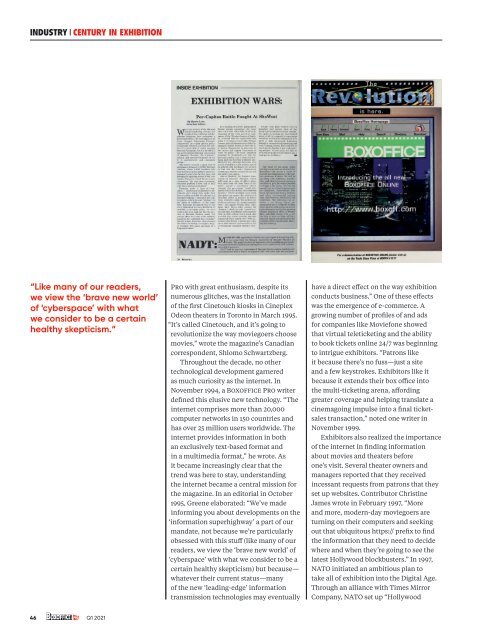Boxoffice Pro Q1 2021
Boxoffice Pro is the official publication of the National Association of Theatre Owners.
Boxoffice Pro is the official publication of the National Association of Theatre Owners.
Create successful ePaper yourself
Turn your PDF publications into a flip-book with our unique Google optimized e-Paper software.
INDUSTRY CENTURY IN EXHIBITION<br />
“Like many of our readers,<br />
we view the ‘brave new world’<br />
of ‘cyberspace’ with what<br />
we consider to be a certain<br />
healthy skepticism.”<br />
<strong>Pro</strong> with great enthusiasm, despite its<br />
numerous glitches, was the installation<br />
of the first Cinetouch kiosks in Cineplex<br />
Odeon theaters in Toronto in March 1995.<br />
“It’s called Cinetouch, and it’s going to<br />
revolutionize the way moviegoers choose<br />
movies,” wrote the magazine’s Canadian<br />
correspondent, Shlomo Schwartzberg.<br />
Throughout the decade, no other<br />
technological development garnered<br />
as much curiosity as the internet. In<br />
November 1994, a <strong>Boxoffice</strong> <strong>Pro</strong> writer<br />
defined this elusive new technology. “The<br />
internet comprises more than 20,000<br />
computer networks in 150 countries and<br />
has over 25 million users worldwide. The<br />
internet provides information in both<br />
an exclusively text-based format and<br />
in a multimedia format,” he wrote. As<br />
it became increasingly clear that the<br />
trend was here to stay, understanding<br />
the internet became a central mission for<br />
the magazine. In an editorial in October<br />
1995, Greene elaborated: “We’ve made<br />
informing you about developments on the<br />
‘information superhighway’ a part of our<br />
mandate, not because we’re particularly<br />
obsessed with this stuff (like many of our<br />
readers, we view the ‘brave new world’ of<br />
‘cyberspace’ with what we consider to be a<br />
certain healthy skepticism) but because—<br />
whatever their current status—many<br />
of the new ‘leading-edge’ information<br />
transmission technologies may eventually<br />
have a direct effect on the way exhibition<br />
conducts business.” One of these effects<br />
was the emergence of e-commerce. A<br />
growing number of profiles of and ads<br />
for companies like Moviefone showed<br />
that virtual teleticketing and the ability<br />
to book tickets online 24/7 was beginning<br />
to intrigue exhibitors. “Patrons like<br />
it because there’s no fuss—just a site<br />
and a few keystrokes. Exhibitors like it<br />
because it extends their box office into<br />
the multi-ticketing arena, affording<br />
greater coverage and helping translate a<br />
cinemagoing impulse into a final ticketsales<br />
transaction,” noted one writer in<br />
November 1999.<br />
Exhibitors also realized the importance<br />
of the internet in finding information<br />
about movies and theaters before<br />
one’s visit. Several theater owners and<br />
managers reported that they received<br />
incessant requests from patrons that they<br />
set up websites. Contributor Christine<br />
James wrote in February 1997, “More<br />
and more, modern-day moviegoers are<br />
turning on their computers and seeking<br />
out that ubiquitous https:// prefix to find<br />
the information that they need to decide<br />
where and when they’re going to see the<br />
latest Hollywood blockbusters.” In 1997,<br />
NATO initiated an ambitious plan to<br />
take all of exhibition into the Digital Age.<br />
Through an alliance with Times Mirror<br />
Company, NATO set up “Hollywood<br />
46 <strong>Q1</strong> <strong>2021</strong><br />
40-47_CiE-90s.indd 46 12/02/<strong>2021</strong> 12:31

















